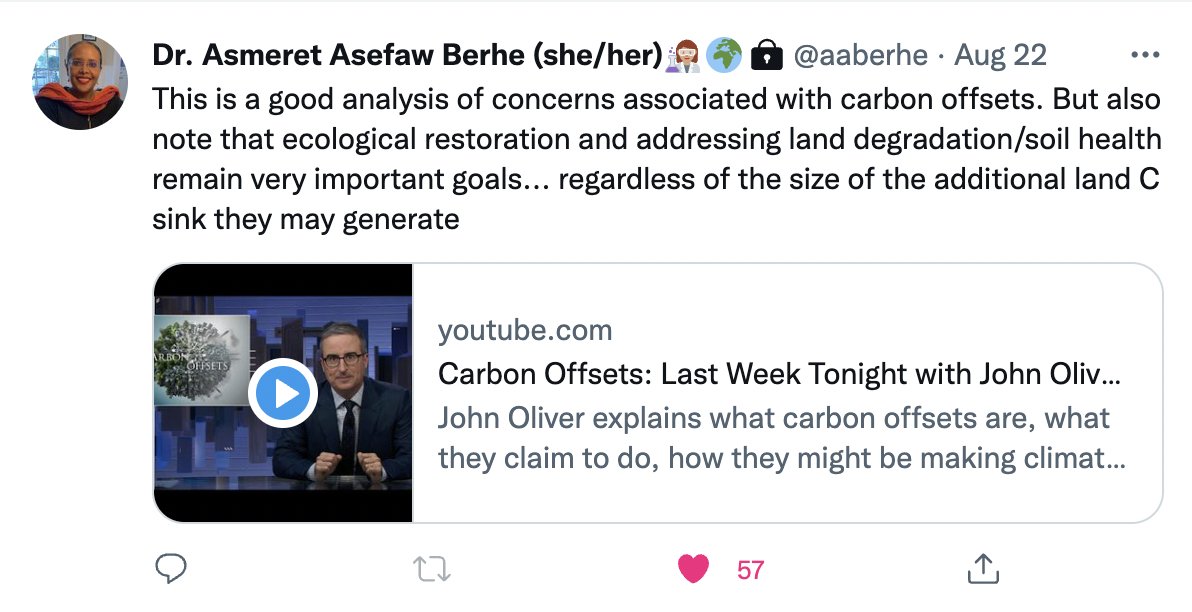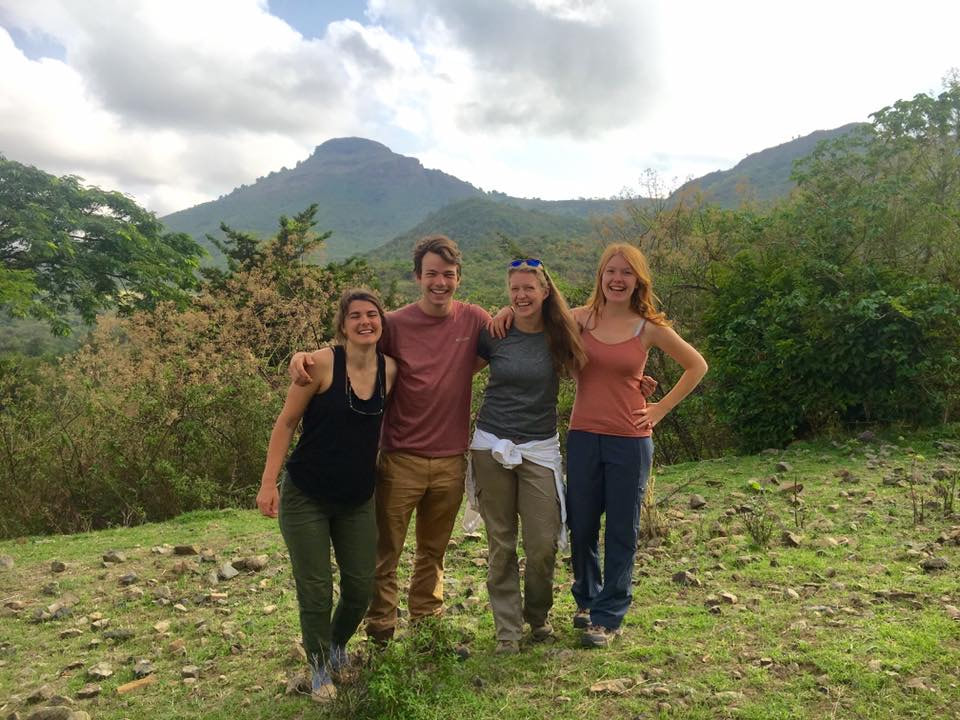 When something draws the ire of John Oliver it is usually a sign that topic is about to leave academic conversations and hit the public lexicon. His latest episode on carbon offsets is a thorough takedown, focusing on the absence of regulation, potential for corporate greenwashing, and lack of actual impact. For those who haven’t watched yet, here are some main talking points:
When someone first learns about carbon offsets via an episode of John Oliver, they’re liable to repeat his talking points without pursuing further information or perspectives. I am guilty of having done this with many of his other episodes on topics where my prior knowledge was limited. And compared to many outlets where people get info (i.e., social media), a 20-minute investigative report by Oliver is a more nuanced view than an average consumer will receive. However, on this particular topic I wanted to add a few other considerations that I think are important. As Dr. Asmeret Berhe points out in this tweet, many of the goals behind carbon offsets are ultimately thing we want. Not only do they remove CO2 from the atmosphere or prevent future potential CO2 emissions, but nature-based climate solutions can provide environmental co-benefits that increase the impact of the funding. In the example of soil, changing management strategies to increase carbon in the soil will also generally increase water retention (resilience against drought), structural integrity (resilience to erosion), and nutrient retention (reduction of fertilizer run off and downstream eutrophication). Protecting our forests, planting new trees, and improving soil health, when done responsibly and with intention, can all be important tools in building a greener future. Allocating greater resources toward those initiatives can often help overcome financial barriers and incentivize early adopters, particularly in agriculture. Finally, even if we halt fossil fuel emissions today, we still need to draw down CO2 from the atmosphere and nature based climate solutions are one way we can start to address that. All of this doesn’t change the fact that carbon offsets allow companies to continue operating as usual without fundamentally decreasing the CO2 emissions of their operations. That is a huge and very real problem. But rather than throwing out the concept of carbon offsets entirely, perhaps we can iteratively develop the concept to increase the effect of such programs. Channeling corporate funding toward green initiatives is a useful path that can parallel government programs, or when Washington ties itself in knots, can continue providing capital when other sources of revenue are uncertain. What could carbon offsets or credits look like if they were tightly regulated with high standards and metrics for impact, not just practice? If more of the money were allocated to independent monitoring and verification? If there was one global standard for carbon offset projects? Corporations will always find loopholes that maximize their profit, but we can find ways to close those loopholes and channel funding toward scientifically backed causes. These companies are willing to pay for their license to operate, so we should increase the standards to which we hold these companies and leverage their money for greater effect. And we can do all of this while also demanding a decrease in CO2 emissions. Carbon offsets are certainly an imperfect system. But maybe it’s a system worth fixing rather than abandoning. I’m personally curious to see how carbon credit and offsets will continue to evolve in the future as part of the larger portfolio of tools to address the climate crisis. More Resources -Another perspective on the John Oliver piece from Dr. Madeleine Nicholas -How to Save a Planet podcast: Can the World Cup be Carbon Neutral -The Carbon Curve: The Fatal Flaw with Most Carbon Offsets -Women in Ag Science podcast episode with Dr. Asmeret Berhe
0 Comments
I love to expand my knowledge of soil health science and policy by listening to other experts. Since much of my day is spent grinding, acidifying, and weighing soils, audio formats are my preferred method of taking in new information. It's pretty hard to read a scientific paper while you are elbow deep in soil samples. My favorite podcasts are really well researched and produced, they bring in voices from the worlds of policy, non-profit work, and farming.
This is a curated list of my favorite shows and episodes about soil science, health, and policy. How to Save a Planet and A Matter of Degrees have episodes about all kinds of climate related matters but I've picked out the soil episodes to highlight here. Drs. Ayanna Elizabeth Johnson, Leah Stokes and Katharine Wilkinson are all co-authors of the anthology "All We Can Save", which I cannot recommend enough. Sometimes "A Matter of Degrees" episodes will feature a reading of essays from that book, which, even if you have read it, take on a new level of impact in audio format. The "People of Soil Health" podcast is entirely about soils and all 32 episodes are valuable because of the different people they interview. Most episodes feature interviews with farmers trying soil health solutions on their real farms and discussing the costs, benefits, challenges, and room for improvement. The Soil Health Partnership closed this year due to fiscal challenges, but still has a ton of resources available on its website. Only 10 episodes are available on Apple Podcasts, but the People of Soil Health website has all 32 episodes. Hopefully some of these episodes can help expand your understanding of soil as a tool for fighting the climate crisis! How to Save a Planet (Ayanna Elizabeth Johnson & Alex Blumberg)
A Matter of Degrees (Leah Stokes & Katharine Wilkinson)
The People of Soil Health (Soil Health Partnership)
Hello and welcome to my second attempt at a science blog! In my first blog, I was writing about my time as an undergraduate at Colgate University doing field work in Ethiopia. It started as a means of let my parents know I was ok during my trip, but turned into a great way to document the field work experience and has been fun to return years later. Being a part of that research team was an incredible entry point to ecology and an incredible project over all. If you want to learn more about church forest conservation, there has been a lot of great coverage of our research which you can find compiled at Dr. Catherine Cardelus' website.
The name of this blog #scicomm(entary) is meant to convey that I will be writing commentary on science communication, in this case mostly of environmental and climate topics. I'm not doing too much field work now toward the end of my PhD but instead spending a lot of time reading scientific papers related to my research. My dissertation work is focused on the effects of climate change on soil carbon, and since I started my PhD in 2016, the discourse around soil carbon has dramatically increased. I have become interested in conversations about soil carbon and "natural climate solutions" more broadly. Reading the published papers, the twitter buzz around those papers, response papers, and coverage in blogs and national media can be overwhelming and intimidating, even for someone who is supposed to be an expert in these topics! This makes me wonder how the "average consumer" is handling the influx of information as news outlets start to ramp up their (relatively anemic) climate news coverage. Pressure to develop climate solutions combined with the pressure of academia to publish in high impact journals is a dangerous combination. It's how a study about the potential of trees to be a carbon sink results in claims that we can "solve" climate change with trees, results in headlines like: Why We Believe Planting 1 Trillion Trees Can Save the Planet -Time Planting a trillion trees could be the "most effective solution" to climate change, study says - CBS The most effective way to tackle climate change? Plant 1 trillion trees - CNN This then spawns a series of papers pointing out the limitations of such claims (ie, planting trees in ecosystems that don't naturally have trees is likely to have negative consequences on C storage), which spawns headlines like: Why Planting Trees Won’t Save Us. If a climate solution sounds too good to be true, it probably is. Two new studies expose the magical thinking around the trillion trees initiative- Rolling Stone Trying to Plant a Trillion Trees Won't Solve Anything- Wired It's understandable that the average news consumer might be more than a little confused. More concerning, they might be a little distrustful of climate science. If the scientists can't agree on a climate solution, do we have any hope at all? Unfortunately, neither academic publications nor front-page news rewards nuanced conclusions in headlines. It is extremely common to see research findings scaled up in a way that the data shouldn't be used, but that makes for a compelling closing argument. I'm guilty of this myself, as much as I hate to admit it. This cycle played out on a global stage with the tree planting debacle and now it seems that soil carbon is heading into the same roller coaster. How can we interrupt this up and down narrative and portray all of these climate "solutions" is a way that everyone can understand? What is the realistic potential of soil carbon to drawdown atmospheric CO2 relative to planting trees? How do these compare to the potential of solar to decrease emissions? Working our way out of the current climate situation we have dug ourselves into will take all of the solutions and ingenuity humanity can come up with. If you're interested in learning about the multitude of axes on which great people are taking on the adaptation/mitigation/justice aspects of climate change, read "All We Can Save". This compilation of essays by women leading the climate revolution is a great example of the kind of realistic, hopeful, multifaceted climate approach that should be communicated to public. In the mean time, I will be here, commentating and hopefully contextualizing these on-going climate solution debates and how they are covered in the news. I will probably also share thoughts on the ways in which science is currently done and how it needs to evolve to address the climate crisis. Inevitably I will share great podcast episodes. Who knows what else will end up in this blog! My hope is that it might be a useful resource for anyone hoping to dig behind the headlines to find out what they, and we, should all be doing to save the planet. |
About MeAn ecosystem ecologist perspective on the conversations around natural climate solutions. Archives
August 2022
Categories |


 RSS Feed
RSS Feed
